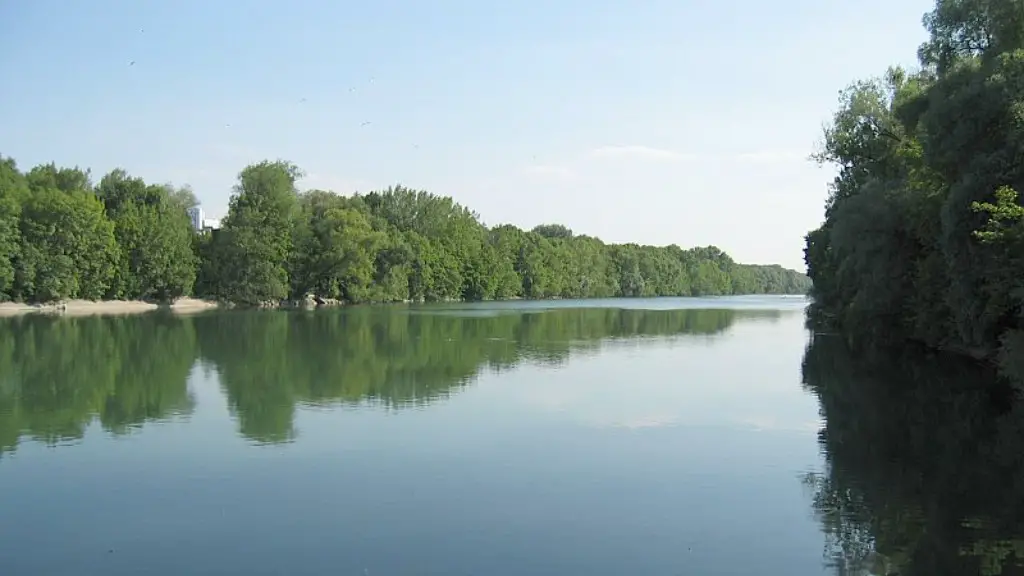The Nile River was an essential part of the foundation of the Ancient Egyptian civilization. The river provided the water, sustenance, and communication routes to make possible one of the world’s oldest and most successful societies. The Ancient Egyptians believed that the Nile was responsible for their prosperity, for the rains that irrigated their land, and for the bounty of the fertility it brought to their fields. This river was a lifeline to the Ancient Egyptians that provided them with the nourishment they needed.
The ancient Egyptians developed a method of writing, along with a strong legal system, both of which were important tools for keeping records and advancing their civilization. Writing, along with the Nile River, enabled them to communicate with each other and keep track of developments in the lands around them. It was also through writing that some of the oldest records about the Nile River were preserved, allowing future generations to study the history of this region.
The Nile River supplied the Egyptians with regular flooding, which turned the surrounding land into dark, rich soils that were perfect for agriculture. The Nile’s regular flooding further provided the Ancient Egyptians with a reliable source of irrigation to grow their crops. Additionally, the Nile provided Ancient Egypt with water for drinking and bathing, as well as transportation of goods and people between different settlements. This made trade and travel much more efficient, which led to a rise in the standards of living. The richness of the soil enabled Ancient Egypt to produce more than enough of the food and goods that they needed to survive and thrive.
This river was also the lifeline for the Egyptians’ religious beliefs. Along its banks the Egyptians developed some of their most important temples, shrines, and pyramids. The goddess Isis, the god Osiris and other popular gods were connected to the river and described as rulers of the Nile and its fertility. In some cases, the Ancient Egyptians believed that the gods created the Nile River and its annual flood, making it even more significant to their culture and religious practice.
Throughout its long history, the Nile River has been a powerful source of inspiration and played an integral role in the growth and development of Ancient Egyptian society. It has shaped the culture and beliefs of the Egyptian people, providing them with a strong sense of identity, unity, and purpose. Its sustaining power inspired them to create the magnificent monuments and artwork that we still venerate today. It is clear that the Nile River was an essential part of the Ancient Egyptian civilization.
The Impact of Trade
The Ancient Egyptians were accomplished traders and the Nile River was instrumental in helping them expand their trade networks. By utilizing the waters of the Nile, the Egyptians were able to set up ports and trading posts along its banks in order to transport goods from one area to another. This enabled them to obtain valuable resources from other areas and provide trade and profit to their own. In addition, the Ancient Egyptians developed boats that allowed them to navigate the river, exporting their goods to distant parts of the world and sailing even as far as India. This trade helped to create wealth and opportunity for the Egyptians, enabling them to support the growth of their civilization.
Political Structure
The Nile had a significant impact on Ancient Egypt’s political structure. It served as the boundaries of the different states, defining the extent of the kingdom. This prevented outside interference, making it easier for Egyptians to develop strong and unified social structures. The Nile also allowed the Egyptian government to monitor and control trade, taxation, and military movements. The Nile’s tributaries also provided a wide range of resources, enabling the government to create prosperous and self-sufficient societies.
The Legacy of the Nile River
The legacy of the Nile River cannot be understated. Its waters have sustained and nurtured Egypt for millennia, allowing its civilizations to develop and flourish. Today, the Nile continues to play an important role in the lives of Egyptians, providing vital nourishment and potable water to the people and allowing them to cultivate their land and thrive. As such, the Nile River is a significant part of the heritage of Egypt and its people.
Environmental Impacts
The impact of the Nile River on the environment of Egypt is tremendous. Its waters are responsible for much of the country’s biodiversity, as it serves as a source of food and nourishment to many species of plants and animals. In addition, the Nile’s waters provide habitats and spawning grounds for fish, supporting local fisheries and providing Egyptians with a vital source of nutrition. Unfortunately, the river has also been the site of pollution, and in some areas the Nile is so polluted that it is unsafe for humans to touch or come in contact with its waters. To combat this, a number of initiatives have been launched in recent years to combat erosion and preserve the valuable resources of the Nile.
The Significance of the Nile River in Ancient Egypt
The ancient Egyptians saw the Nile River as a key source of their livelihood and were heavily reliant on it for sustenance, transportation, and communication. Its fertile soil and regular flooding made it simple for the Ancient Egyptians to irrigate their crops, resulting in the growth of agricultural surpluses and the ability to expand their population. This abundance of resources, coupled with the efficiency of their writing and legal systems, was instrumental in the development of their civilization, and the Nile’s legacy has continued to remain relevant to this day.


